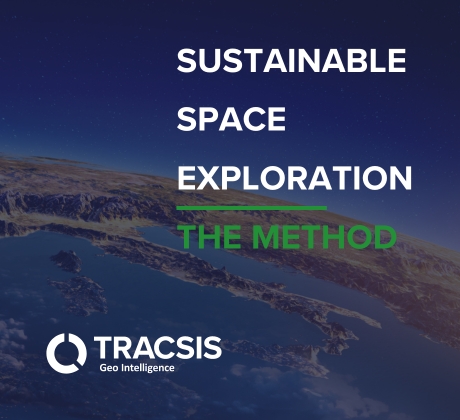The space sector is experiencing a renaissance, marked by unprecedented space exploration and technological advancement. As humanity ventures further into the cosmos, the imperative for sustainable practices becomes increasingly critical.
This article delves into the challenges and opportunities of ensuring sustainable space exploration, with a particular focus on the UK’s role and the pivotal contribution of geospatial intelligence.

The Space Race
The renewed interest in space exploration, driven by both governmental and commercial entities, has ignited a new space race. Nations and private companies are vying to establish a presence on the Moon and Mars, while simultaneously developing the technologies to support these ambitious goals.
However, this rapid expansion raises significant concerns about the long-term sustainability of space activities.
The UK’s Role in Sustainable Space Exploration
The UK has positioned itself as a key player in the global space sector. With a thriving space industry and a commitment to sustainability, the UK is well-placed to contribute to the development of responsible space exploration practices.
Geointelligence: A Catalyst for Sustainable Space Exploration
Tracsis Geo Intelligence harnesses geospatial data to address complex space challenges. Our expertise in data analysis, visualisation, and modeling is uniquely positioned to support sustainable space exploration in several ways:
- Space debris mitigation: By analysing satellite trajectories and orbital data, you can identify potential collision risks and develop strategies for debris removal.
- Resource mapping: Our geospatial analysis capabilities can assist in identifying and assessing potential resource sites on celestial bodies, ensuring responsible extraction practices.
- Environmental monitoring: By monitoring changes in the lunar and Martian environments, we can provide early warning systems for potential hazards and support the development of protective measures.
- Mission planning and optimisation: Our data-driven insights can help optimise mission planning, reducing fuel consumption and minimising environmental impact.

The Backbone of Sustainable Space Exploration
Central to realising these ambitions is the discipline of geospatial data science. By merging geographic information systems (GIS), data analytics, and machine learning, geospatial data scientists extract invaluable insights from vast datasets.
This expertise is instrumental in identifying patterns, predicting outcomes, and optimising processes, all of which are essential for sustainable space exploration.
Tracsis Geo Intelligence is at the forefront of geospatial data science, applying these techniques to address complex challenges across various industries. Our understanding of geospatial data & analytics empowers us to deliver innovative solutions for sustainable growth and development.
By harnessing the power of geospatial data, we can unlock new possibilities for space exploration, resource management, and environmental protection.
A Catalyst for Sustainable Development
The application of geospatial data and analysis extends far beyond space exploration. Across various industries, geointelligence is driving innovation and sustainable practices.
- Agriculture: By analysing soil composition, weather patterns, and crop yields, geospatial data can optimise farming practices, reduce environmental impact, and ensure food security.
- Energy: Geointelligence can identify optimal locations for renewable energy projects, such as solar and wind farms, and optimise energy grids for greater efficiency.
- Environmental Management: Monitoring deforestation, pollution, and natural hazards through geospatial data helps inform conservation efforts and disaster response.
- Urban Planning: Geospatial analysis can support sustainable urban development by identifying areas for green spaces, transportation infrastructure, and efficient resource allocation.
- Climate Change: By analysing climate data and its impact on various systems, geointelligence contributes to the development of adaptation and mitigation strategies.

A Framework for Sustainable Space Exploration
To address the challenges of space sustainability, a comprehensive and collaborative approach is required.
Key recommendations include:
- International cooperation: Strengthening international partnerships to develop shared standards and guidelines for space exploration.
- Data sharing and transparency: Promoting the open sharing of space data to foster collaboration and inform decision-making.
- Investment in research and development: Supporting research into new technologies for sustainable space activities, such as advanced propulsion systems and in-situ resource utilisation.
- Public awareness and education: Raising public awareness about the importance of space sustainability and inspiring future generations of space explorers.
Ensuring the long-term sustainability of space exploration is paramount for the preservation of celestial bodies and the advancement of human civilisation. Through international collaboration, investing in research, and harnessing the power of geointelligence, we can navigate the complexities of space exploration responsibly.
Tracsis Geo Intelligence is committed to supporting these efforts by providing the data-driven insights necessary for informed decision-making. Together, we can build a future where space exploration is not only ambitious but also environmentally responsible.
